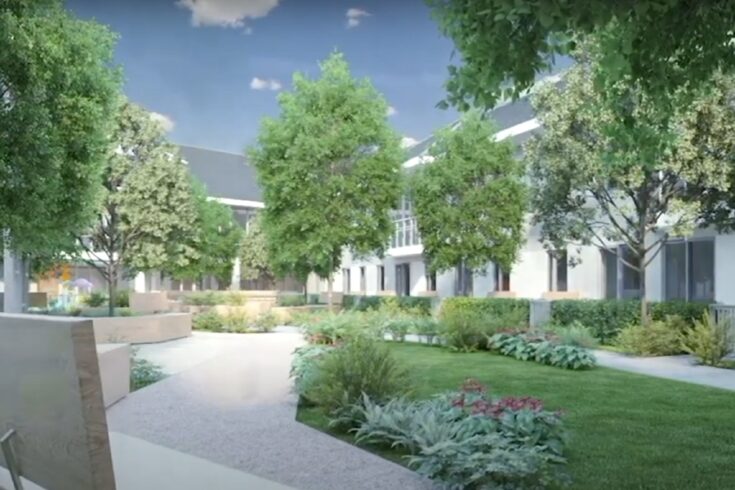The 117 prisons in England and Wales house around 80,000 prisoners, including 3,250 women. Research by Professor Yvonne Jewkes shows that over a quarter of prisoners (22,000) are currently housed in grim Victorian-era accommodation, and in small, often overcrowded, cells that limit the potential of rehabilitating offenders.
Since 2014 Professor Jewkes has worked with prison authorities in the UK and further afield to encourage new thinking about prison spaces. She advances the well-researched notion that progressive prison design could lead to a less hostile, more rehabilitative environment that offers a safer and better work environment for prison staff and greater normality for visitors, particularly children. This not only improves the experiences of prison staff, visitors and prisoners, but can affect rehabilitation and the likelihood of reoffending.
Video credit: ESRC.
On-screen captions and an autogenerated transcript are available on YouTube.
About the project
As part of her research, Professor Jewkes examined all aspects of prison commissioning, procurement, planning and design and the impacts of architecture and design on prisoners and prison staff.
She also explored two prisons recognised as exemplars of progressive prison design – Halden Prison in Norway and Storstrøm Prison in Denmark. In addition she looked at designs that were highly progressive but not commissioned, including Holmsheidi Prison in Iceland and Haren Prison in Belgium.
She has successfully incorporated best practice lessons from this research into normalising prison environments. This aims to make time in custody more humane through, for example:
- larger windows
- more green spaces
- fixtures and fittings that are domestic rather than institutional in feel
- bright, welcoming rooms for family visits.
“The built environment shapes how we think and feel,” she explains. “Architecture and design play an important part in rehabilitation which, over the longer term, will make our society safer through reduced re-offending.”
None of her work, she stresses, is about making prisons ‘softer’ or less of a deterrent to criminals. “Normalising prisons and making them less ‘institutional’ is essential if they are to be more than human warehouses that return offenders to society with their lives even more fractured, and their life chances even more reduced, than when they were admitted,” she explains.
Impacts of the project
Professor Jewkes carried out qualitative research in this area across seven years. Her research identifies improvements in design that have been implemented around the world to enhance the behaviour, mental health, and wellbeing of both prisoners and staff.
Irish Prison Service modernisation programme
Professor Jewkes has worked closely with the Irish Prison Service (IPS) on a wide-ranging modernisation programme that’s strongly influenced by her penal philosophy of humanity, hope and rehabilitation. In planning the new 50-bed women’s prison in Limerick (a €71 million project due to open in 2022), she persuaded the IPS senior team to view female offenders as individuals with complex emotional and clinical needs, but also with considerable potentials and futures.
Using Maggie’s Cancer Care Centres as an exemplar, Professor Jewkes encouraged the IPS to think not about an architecture of incarceration but, instead, an ‘architecture of hope’.
Crucially, the hope built into the bright, more homely Limerick women’s prison will benefit offenders, prison staff and visitors alike, Professor Jewkes insists. “It’s important to remember that prisons are working environments too,” she says. “When architects consider the needs of prison staff in their designs, the result is a happier, healthier and better functioning prison as a whole.”
More humane prison designs in several countries
Professor Yvonne Jewkes’ research has resulted in nine new prisons in England and Wales, the Republic of Ireland, Australia and New Zealand being designed with rehabilitation goals prioritised at least as much as punishment and security objectives.
Her findings that ‘normalised’ and more humane living spaces encourage rehabilitation and potentially less recidivism underpin 12 prison refurbishment projects in the UK, Australia and New Zealand.
Her work has changed thinking in prison and correction services, ministries of justice and HM Inspectorate of Prisons, prompting the UK Ministry of Justice’s 2019 decision to use toughened glass rather than traditional bars in future prisons in England and Wales, a change that brings improved security within a less punitive environment.
Her findings led to the removal of window bars from existing prisons including HMP Hydebank Wood in Northern Ireland and Wheatfield Prison in Dublin.
Ciarán M. Nevin, Irish Prison Service sums up the research’s immense value: “It is fair to say that Yvonne’s research and contributions resulted not only in a complete re-think of the concepts for the new women’s prison in Limerick, but also brought about a much more innovative and positive approach to prison design and prison purposing.”
Find out more
Professor Yvonne Jewkes is Winner of the Outstanding Societal Impact category in the ESRC Celebrating Impact Prize 2020.
Read the article co-authored by Professor Yvonne Jewkes How lessons in Scandinavian design could help prisons with rehabilitation on The Conversation.
Read the article by Professor Yvonne Jewkes How to build better prisons on The Conversation.
See Professor Yvonne Jewkes’ website on Prison Architecture and Design, which includes links to further articles and resources.
Top image: Computer visualisation of the outdoor visiting space for the new Limerick Prison.

